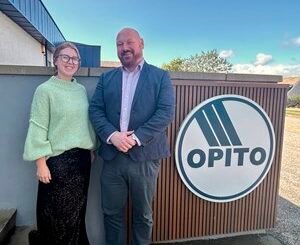As global supply chains become more interconnected and volatile, adopting digital solutions are no longer a luxury, they are a necessity. This article examines how digitalization improves supply chain management in the oil and gas industry, highlighting a case study where Fluor was able to effectively track 2 MM materials, prevent disruptions and increase supply chain visibility.
Supply chain disruptions are one of the biggest challenges facing the oil and gas industry today. From fluctuating demand to the impact of global events, the industry must continuously adapt to avoid costly delays and disruptions. The complex nature of oil and gas operations, where materials, equipment and personnel are often spread across vast regions, adds to the difficulty. In response to these challenges, companies are turning to digitalization to streamline their supply chains, gain real-time insights and mitigate disruptions before they become unmanageable.
Digitalization plays a crucial role in addressing supply chain restraints by automating processes, enhancing visibility and improving overall operational efficiency. By leveraging digital tools and platforms, oil and gas companies can track materials and equipment in real-time, reduce manual errors and scale according to their needs by responding swiftly to potential bottlenecks. As global supply chains become more interconnected and volatile, adopting digital solutions are no longer a luxury, they are a necessity.
A real-world example: Digitalization in action. A powerful example of how digitalization can transform supply chain management is seen in the partnership between Fluor and Hexagon’s Jovix® system. In a success story involving a large grassroots oil refinery project in Kazakhstan, Fluor and Hexagon partnered to improve the refinery’s materials management processes. The project—known as the Future Growth and Wellhead Pressure Management Project (FGP-WPMP)—aimed to increase crude oil production at the Tengiz Oil Field by 260,000 bpd, with an overall investment of $36.8 B.
Managing a project of this scale required a robust and highly efficient materials management system. Fluor decided to implement Jovix, an award-winning Material Readiness® application designed specifically for industrial construction and material fabrication. By integrating Jovix into its operations strategy, Fluor was able to enhance visibility into the supply chain using radio frequency identification (RFID) tags, barcodes and rugged tablets.
The project initially deployed 500,000 RFID tags to track materials, a number that eventually grew to encompass the tracking of 2 MM materials over the course of the project. By automating material identification and tracking, Jovix significantly improved the flow of materials across various global locations, including upstream fabrication shops and modularization yards in South Korea.
The digitalization of supply chain processes not only streamlined operations but also helped Fluor avoid potential supply chain bottlenecks. This was especially critical in a project of this size and complexity, where delays could have had a significant financial and operational impact. With new, automated tracking features, including gate readers and vehicle-mounted readers, material location updates were available in real time, enabling managers to make informed decisions quickly.
The role of digitalization in preventing supply chain disruptions. One of the key benefits of digitalizing supply chain management is the ability to mitigate disruptions before they escalate. In Fluor’s case, integrating RFID tags and barcoding technology allowed for seamless tracking of materials from fabrication sites to the field. This level of visibility meant that Fluor could anticipate potential delays, adjust schedules and reallocate resources as necessary, ensuring the project stayed on track.
By digitizing supply chain operations, oil and gas companies can achieve greater transparency across the entire value chain. They can monitor the flow of goods, equipment and personnel in real time, which helps reduce inefficiencies, minimize downtime and optimize the use of resources. This is particularly important in the oil and gas industry, where delays or missing materials can cause substantial financial losses and operational challenges.
In addition to mitigating disruptions, digitalization also improves collaboration across teams and suppliers. Through integrated digital platforms, all stakeholders can access up-to-date information on inventory levels, shipment statuses and production schedules, fostering better communication and coordination. This is critical in complex projects like the Tengiz expansion, where materials and equipment were sourced from multiple suppliers across the globe.
Looking ahead: The future of digitalized supply chains. As the oil and gas industry continues to face new challenges, the importance of resilient and agile supply chains cannot be overstated. Digitalization is set to play an even more significant role in shaping the future of supply chain management. Advanced technologies like artificial intelligence (AI), machine learning and predictive analytics are expected to further enhance the ability to anticipate supply chain risks and optimize decision-making processes.
The success of Fluor’s deployment of Hexagon’s Jovix solution highlights how digital tools can be leveraged to transform supply chain operations in the oil and gas sector. By increasing visibility, improving material tracking and automating manual processes, Hexagon helped ensure that the Tengiz Expansion Project was executed efficiently and on time. The project’s ability to track 2 MM materials and integrate RFID technology across global supply chains is a testament to the power of digitalization.
For oil and gas companies looking to avoid the kind of business disruptions caused by supply chain restraints, the solution lies in adopting digital platforms that provide real-time data, automate workflows and enhance collaboration. As demonstrated in the Kazakhstan project, digitalization is not just about streamlining processes, it is about building more resilient, adaptive supply chains that can withstand the uncertainties of today’s global economy.
About Hexagon
Hexagon is a global leader in digital reality solutions, combining sensor, software and autonomous technologies.
Hexagon’s Asset Lifecycle Intelligence division helps clients design, construct and operate more profitable, safe and sustainable industrial facilities. We empower customers to unlock data, accelerate industrial project modernization and digital maturity, increase productivity and move the sustainability needle.
Our technologies help produce actionable insights that enable better decision-making and intelligence across the asset lifecycle of industrial projects, leading to improvements in safety, quality, efficiency and productivity, which contribute to economic and environmental sustainability. Hexagon (Nasdaq Stockholm: HEXA B) has approximately 22,000 employees in 50 countries and net sales of approximately €4.3 B. Learn more at hexagon.com, and follow us @HexagonAB
This article was originally posted at www.worldoil.com



Be the first to comment